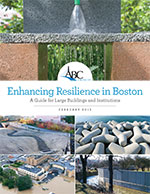A Better City Leading Efforts to Increase Building Resilience in Boston
April 16, 2015
The impacts from a changing climate are happening now and projections indicate the region will continue to experience rising summer temperatures, increased storm intensity, and higher sea levels. Over just the last few years we have experienced record breaking snow storms, tornados in Revere and Springfield, heavy rains and flooding from Hurricane Irene, and a near miss from Super Storm Sandy.
As a coastal city, Boston is especially vulnerable. Flood risks from rising seas, storm surge, and heavy rains pose the most significant threats. Recent studies from The Boston Harbor Association and Federal Emergency Management Agency (FEMA), present a future where significant portions of South Boston, Financial District, Back Bay, South End, and Cambridge face a real risk from flooding.
 The quality of life and economic competitiveness of our region is threatened by these events and we must begin to identify opportunities to reduce the risk and increase the resilience of our communities, infrastructure, and buildings. ABC was recently tasked by the Boston Green Ribbon Commission to further study resilience options for private-sector buildings and to answer some of these questions. Our report, Enhancing Resilience in Boston: A Guide for Large Buildings and Institutions illustrates the climate-related risk potential for commercial buildings, and presents available technologies and solutions for retrofits and new construction. These tools are grouped for buildings inside and outside projected floodplains that enables building owners to assess their own level of acceptable risk in determining the threat to their specific property.
As a part of the research, ABC developed a database of 33 technologies and products available to building owners, including their costs, suppliers, , regulatory requirements and applications for addressing storm water management, flood-proofing, sea level rise, and the urban heat island effect. This online toolkit is free and available to the public and will be continually added to as new technologies and products are developed.
The report and toolkit was released at a February event, which featured Rob de Vos, Consul General of the Kingdom of the Netherlands in New York. The Netherlands with more than 50% of its population living and 70% of their GDP produced below sea level understands more than than almost any other country in the world understands the threats that climate change brings through rising seas and severe storms. Based on this real threat, resiliency and preparedness for the Netherlands is not a choice but a reality that they have learned to incorporate throughout the public and private sector. We have much that we can learn from the Dutch and ABC looks forward to collaborating with the Dutch Consulate to learn from them experiences and bring best practices to Boston.
The quality of life and economic competitiveness of our region is threatened by these events and we must begin to identify opportunities to reduce the risk and increase the resilience of our communities, infrastructure, and buildings. ABC was recently tasked by the Boston Green Ribbon Commission to further study resilience options for private-sector buildings and to answer some of these questions. Our report, Enhancing Resilience in Boston: A Guide for Large Buildings and Institutions illustrates the climate-related risk potential for commercial buildings, and presents available technologies and solutions for retrofits and new construction. These tools are grouped for buildings inside and outside projected floodplains that enables building owners to assess their own level of acceptable risk in determining the threat to their specific property.
As a part of the research, ABC developed a database of 33 technologies and products available to building owners, including their costs, suppliers, , regulatory requirements and applications for addressing storm water management, flood-proofing, sea level rise, and the urban heat island effect. This online toolkit is free and available to the public and will be continually added to as new technologies and products are developed.
The report and toolkit was released at a February event, which featured Rob de Vos, Consul General of the Kingdom of the Netherlands in New York. The Netherlands with more than 50% of its population living and 70% of their GDP produced below sea level understands more than than almost any other country in the world understands the threats that climate change brings through rising seas and severe storms. Based on this real threat, resiliency and preparedness for the Netherlands is not a choice but a reality that they have learned to incorporate throughout the public and private sector. We have much that we can learn from the Dutch and ABC looks forward to collaborating with the Dutch Consulate to learn from them experiences and bring best practices to Boston.




